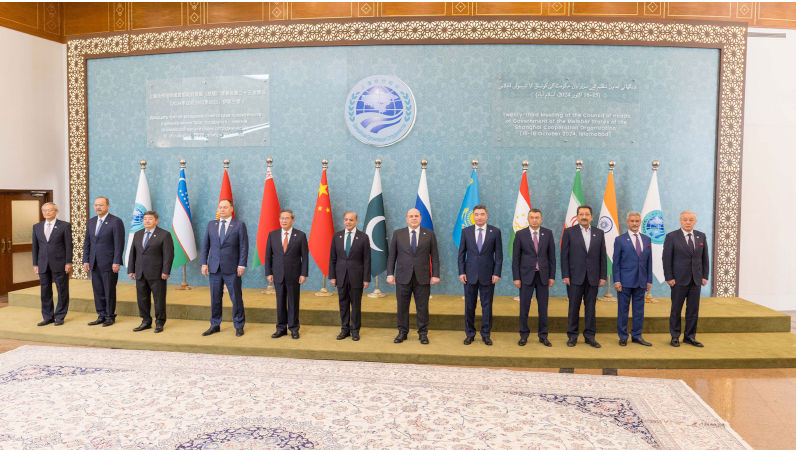The role of the Shanghai Cooperation Organisation in breaking trade barriers and fostering multilateralism
November 1, 2024
As the world faces increasingly complex challenges—from economic downturns to geopolitical tensions—regional organisations like the Shanghai Cooperation Organisation (SCO) are becoming ever more important in promoting multilateral cooperation.
Recent comments by Indian scholar Sudheendra Kulkarni, founder of the Forum for a New South Asia and a close aide to India’s former Prime Minister Atal Bihari Vajpayee, have sparked renewed discussion about the SCO’s potential to not only bolster regional ties but also to challenge global trade protectionism.
The SCO, comprising eight member states that include both India and China, has emerged as a platform for dialogue and collaboration among some of the world’s most populous nations. At the heart of Mr. Kulkarni’s remarks is the idea that the SCO can act as a counterbalance to Western-driven sanctions and protectionist measures that have disrupted global markets. According to Kulkarni, this is particularly crucial for developing nations whose primary focus should be economic growth and poverty alleviation, rather than being caught in the crossfire of geopolitical rivalries.
One of the standout themes in Kulkarni’s statement is his emphasis on the necessity of moving away from dependence on the U.S. dollar and Western-controlled financial systems. Trade between India and China, which surpassed $136 billion last year, serves as a testament to the growing economic ties between these two Asian giants, even amid challenges. Kulkarni argues that organisations like SCO and BRICS have created new avenues for such cooperation, helping countries diversify their economic engagements and reduce reliance on traditional Western financial systems.
This perspective is not only timely but also critical. In a world where global financial markets are increasingly fragmented due to protectionist measures and sanctions, the SCO presents an alternative model—one based on mutual trust, regional cooperation, and an openness to diverse trade routes. In this context, Mr. Kulkarni’s assertion that India’s participation in the SCO can strengthen its economic and technological collaboration with regional powers is particularly significant. As the most populous nation, India stands to benefit greatly from partnerships that foster technological innovation, education, and infrastructure development.
Perhaps the most striking element of the recent SCO meeting in Islamabad was the presence of Indian External Affairs Minister S. Jaishankar. His rare visit to Pakistan marked the first time an Indian foreign minister had visited the country since 2015. While bilateral relations between India and Pakistan remain fraught, Kulkarni optimistically suggested that this visit could help “break the ice” and create a pathway for renewed dialogue between the two nuclear-armed neighbours. Though no direct talks occurred between the Indian and Pakistani delegations, the meeting underscored the potential for the SCO to facilitate at least indirect diplomatic engagement.
At its core, the SCO’s charter stresses the importance of mutual trust, good neighbourliness, and cooperation—values that are especially pertinent for India and Pakistan. The absence of formal bilateral talks at this meeting, while disappointing to some, should not detract from the organisation’s larger goal of fostering dialogue in the long run. If the SCO can provide a space for regional players like India and Pakistan to meet regularly, it may eventually contribute to thawing relations between these long-time rivals.
Mr. Kulkarni’s concerns about Western-imposed sanctions also strike at a larger issue plaguing developing nations. Sanctions and protectionism have disproportionately harmed emerging economies by cutting them off from much-needed finance, investment, and market access. In his view, these measures run counter to the very spirit of globalisation, which should prioritise the collective advancement of all nations rather than sowing division. Kulkarni is right to point out that the focus for developing countries, including India, should be on lifting people out of poverty, rather than engaging in geopolitical squabbles fuelled by external actors.
This sentiment resonates deeply, especially as we consider the future trajectory of the SCO and other multilateral organisations. The SCO’s ability to foster regional cooperation in areas like trade, medicine, digital technology, and food security makes it an indispensable tool in navigating the increasingly multipolar world. As Jaishankar noted during the recent meeting, the SCO’s role in facilitating cooperation on issues ranging from climate action to sustainable development cannot be overstated.
In today’s world, where nationalism and protectionism are gaining momentum, the SCO offers an alternative vision of how nations can come together to address shared challenges. By promoting collaboration over conflict, the SCO creates a forum in which member states can work toward common goals, including economic growth, technological innovation, and regional stability. Mr. Kulkarni’s observations about China’s role in sharing its advancements in technology, infrastructure, and education with other countries are particularly noteworthy. If India and China can set aside their differences and cooperate more closely within the SCO framework, the potential benefits for the region—and for the world—are immense.
Yet, this vision of multilateral cooperation is not without its challenges. The geopolitical rivalry between India and China, exacerbated by border disputes and differing strategic priorities, poses a real obstacle to deepening ties. However, Kulkarni’s optimism offers a valuable counterpoint. He sees the SCO as a platform not just for resolving these differences but for turning them into opportunities for mutual growth.
In conclusion, Mr. Kulkarni’s reflections on the SCO emphasise the critical role this organisation can play in a world increasingly divided by economic and political fault lines. By providing a space for dialogue and collaboration, the SCO can help nations like India and China move away from outdated paradigms of competition and toward a more cooperative future. Most importantly, as Kulkarni underscores, the ultimate goal should be to uplift the developing world, ensuring that globalisation benefits all—not just a privileged few. In a time when protectionism and sanctions are threatening to undo decades of progress, the SCO stands as a beacon of hope for those who believe in the power of multilateralism and cooperation.
